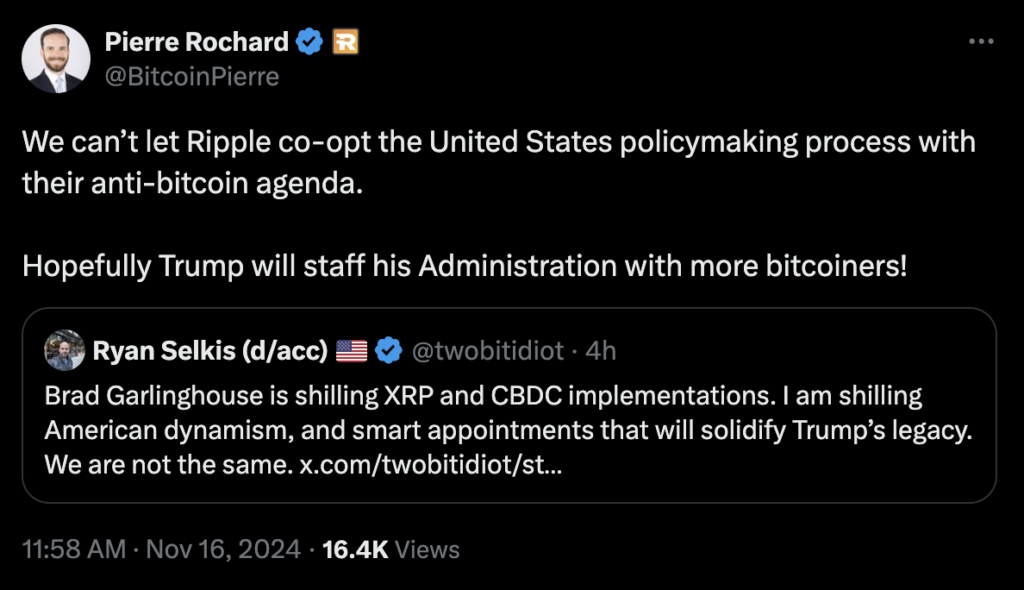-
Ripple Labs is challenging the SEC’s classification of XRP, a lawsuit that could shape the regulatory landscape for digital assets in the U.S.
-
A lawsuit involving SEC Chair Gary Gensler highlights conflicts between regulators and blockchain firms.
-
Ripple’s approach to regulatory compliance is crucial for fostering growth in the cryptocurrency space, particularly in regions like Africa.
Ripple Labs is an influential player in the cryptocurrency market, widely recognized for its groundbreaking cross-border payment technology. Navigating a complex regulatory environment, it often finds itself at the center of discussions regarding digital assets’ futures and trends.
A lawsuit against Gary Gensler, the Chair of SEC, highlights tensions between regulatory bodies and blockchain companies, as these tensions impact investor sentiment and market performance.
The Impact of Ripple Labs on the Crypto Regulatory Climate and XRP Price Surge
The changing crypto regulatory climate profoundly impacts XRP cryptocurrencies like Ripple (XRP). Regulations are integral in shaping market behaviour and investor perception of digital assets like Ripple. A more favourable regulatory environment may increase institutional trust, increasing demand and price surges.
Also, Read: Ripple and Bitnomial vs. the SEC: A Battle for Crypto’s Future in Regulation.
As Ripple works toward transparent and fair regulation, it becomes critical for them to understand how changes to these regulations could affect both their operations and those within the cryptocurrency ecosystem. Their current regulatory issues call attention to an urgent need for reform that accommodates innovation while guaranteeing compliance.
Current Lawsuit Against Gary Gensler
In the middle of Ripple’s struggles is its lawsuit with Gary Gensler over whether or not XRP must be labelled as a safety. This legal struggle represents more than Ripple as an organization; it reflects broader crypto regulatory weather troubles affecting all traders involved. If Ripple wins this legal battle, it could set a precedent favouring another cryptocurrency seeking clarity on their classification under U.S. law.
This lawsuit could have severe ramifications on how regulators view digital assets moving ahead, with any verdict in desire of Ripple to increase legitimacy for XRP and different crypto properties – probably sparking price surges as investors believe will increase with readability provided.
Implications for Ripple’s Operations
Ripple’s legal challenges have forced it to adapt its strategies in response to changing regulations. Compliance remains key; however, successfully navigating this landscape involves proactive engagement with regulators and lawmakers alike.

By advocating for more explicit regulations – in other words, promoting crypto-friendly regulations–Ripple seeks to foster growth and innovation within its ecosystem.
Given ambiguous cryptocurrency regulations, increasing investor acceptance requires additional work on behalf of organizations like Ripple Labs to pave the way for regulations that promote greater participation from retail and institutional investors alike. If successful, efforts such as theirs could pave the way toward increased participation by retail and institutional investors alike.
Impact on XRP Price Surge
A favourable ruling from the court could catalyze an immediate reaction in the market, resulting in a notable XRP price surge. Investors often respond positively to news that signals progress toward more explicit regulations or legitimization of assets they hold or are considering purchasing. Historical trends indicate that positive legal developments frequently correlate with bullish movements in asset prices.
Recent announcements about legal outcomes involving major cryptocurrencies have often caused spikes in trading volume and price appreciation across various platforms. Should Ripple Labs prevail against Gensler’s claims about XRP’s classification, we may witness similarly bullish behaviour concerning it.
Market reactions reflect immediate sentiment and viability for long-term investments within regulated environments. Legal news often has an immediate and profound effect on XRP’s performance; announcements relating to settlements or favourable rulings often cause traders to reevaluate risk profiles associated with holding such assets and gain momentum for further investments.
As we consider these dynamics within today’s context—where uncertainty looms over many aspects of crypto regulation—it becomes evident why developments surrounding Ripple’s lawsuit against Gary Gensler are closely monitored by analysts and traders alike.
Establishing effective frameworks around digital currencies is essential for fostering sustainable growth within this sector. What constitutes *crypto-friendly regulations* includes provisions that encourage innovation while protecting consumers’ interests without stifling development through excessive oversight or unclear guidelines.
Advocated policies seek to enhance conditions specific to Ripple Labs operations while benefitting all parties involved with crypto markets worldwide, particularly those emerging across Africa, where financial inclusion remains crucial.
Conclusion
In conclusion, understanding how ripple effects stemming from litigation impact broader trends reveals much about our current economic climate—the interplay between traditional finance systems grappling with new technologies creates opportunities and challenges ahead.
As we navigate these transformative times marked by increasing interest alongside heightened scrutiny over digital assets—keeping abreast of developments regarding Ripple Labs, especially their ongoing lawsuit against Gary Gensler, will be critical not just for prospective investors hoping to capitalize upon potential XRP price surges, but indeed anyone invested interested witnessing evolution unfolding across global cryptocurrency landscapes!
